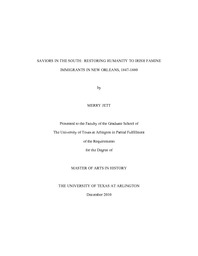
ATTENTION: The works hosted here are being migrated to a new repository that will consolidate resources, improve discoverability, and better show UTA's research impact on the global community. We will update authors as the migration progresses. Please see MavMatrix for more information.
Show simple item record
| dc.contributor.author | Jett, Merry | en_US |
| dc.date.accessioned | 2011-03-03T21:53:24Z | |
| dc.date.available | 2011-03-03T21:53:24Z | |
| dc.date.issued | 2011-03-03 | |
| dc.date.submitted | January 2010 | en_US |
| dc.identifier.other | DISS-10860 | en_US |
| dc.identifier.uri | http://hdl.handle.net/10106/5528 | |
| dc.description.abstract | My thesis begins in during the Irish Famine in 1847, and follows Irish emigrants across the Atlantic Ocean to New Orleans where they faced disease, poverty, and prejudice. During the Irish famine, epidemics struck across class lines and locality, decimating the Irish population. In both the city and the country, the largest providers of care were church dispensaries. Set up in every parish, dispensaries provided care to those who otherwise would have had none at all. Like doctors at the time, dispensaries were unable to eradicate the epidemics, but because they were the most widely used medical facility, they were successful in helping some individuals. In New Orleans, the Irish continued to turn to the church for quality medical care. The established Irish community suffered from class anxiety and did not care for new Irish immigrants. Shunned by the Irish community, the ailing and recently arrived Irish turned to allopathic physicians for medical care. Unknown to Irish immigrants, allopathic physicians struggled against homeopathic physicians and they wanted New Orleans society to see them as legitimate providers of scientific medicine. When physicians failed the new Irish, the immigrants turned to the Sisters of Charity and the Howard Association for care. These two organizations countered the harsh methods of doctors and restored humanity to Irish famine immigrants. This thesis relied on three volumes of Famine and Disease in Ireland edited by Leslie A. Clarkson and E. Margaret Crawford and The Dublin Quarterly Journal of Medical Science. To examine the Irish in New Orleans, this thesis employs numerous primary sources including Medical and Surgical Reporter, New Orleans Medical and Surgical, Medical And Surgical Memoirs: Containing Investigations On The Geographical Distribution, Causes, Nature, Relations And Treatment Of Various Disease, and a collection of papers from Charity Hospital. These sources are the basis for a new narrative about Irish famine immigrants, adding to the scholarly literature that to date has focused mostly on Irish immigrants in major cities along the eastern seaboard of North America. | en_US |
| dc.description.sponsorship | Cawthon, Elisabeth A. | en_US |
| dc.language.iso | en | en_US |
| dc.publisher | History | en_US |
| dc.title | Saviors In The South: Restoring Humanity To Irish Famine Immigrants in New Orleans, 1847-1880 | en_US |
| dc.type | M.A. | en_US |
| dc.contributor.committeeChair | Cawthon, Elisabeth A. | en_US |
| dc.degree.department | History | en_US |
| dc.degree.discipline | History | en_US |
| dc.degree.grantor | University of Texas at Arlington | en_US |
| dc.degree.level | masters | en_US |
| dc.degree.name | M.A. | en_US |
Files in this item
- Name:
- Jett_uta_2502M_10860.pdf
- Size:
- 1.651Mb
- Format:
- PDF
This item appears in the following Collection(s)
Show simple item record


